“We value making patients feel welcome.”
Your donation will help Nurse Laguerre provide the highest-quality care to every patient in need.
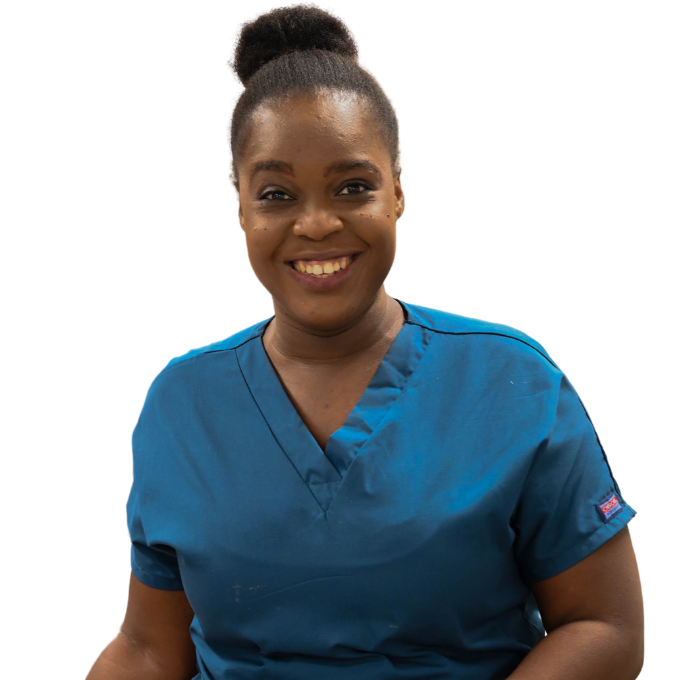
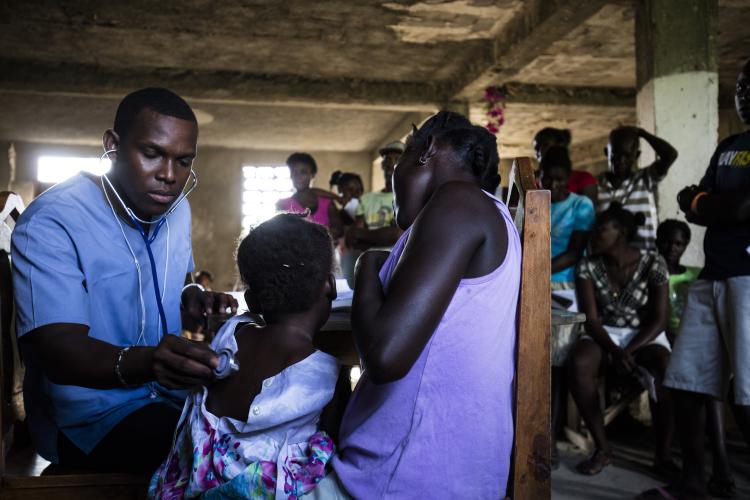
Dr. Samuel Bernard examines a child and her mother at a mobile clinic visit in the Tiburon area on the western end of Haiti’s Southern Peninsula.
In the year since Hurricane Matthew hit southern Haiti on October 4, 2016, and with the help of thousands of supporters, HEI/SBH has been a leading force in providing care and coordinating recovery efforts in the affected areas. While global attention moved away from Haiti in the months after the storm, We remain committed to working side by side with the people of southern Haiti towards smart, resilient solutions to the issues that have made the region so vulnerable to disasters like Hurricane Matthew.
Over the past year, our work has continued to expand to fill the ever-increasing demand for healthcare services in southern Haiti. This expansion has taken many forms: in geographic reach, in services covered, and in capacity to care for more and more patients. Read on to learn about what your support has made possible in the year since the storm hit.
As soon as they could, teams of doctors and nurses from SBH started traveling to the most remote communities on the western end of the Southern Peninsula, which had been hardest hit by the hurricane. Their goal was to provide medical care to people who had been most affected by the storm. Many of the people they saw had not only been without medical care since the hurricane—many had never seen a doctor before in their lives.
These clinics continue, with the support of UNICEF and individual donors, in two key communities that were badly affected by the hurricane: Maniche, north of Les Cayes, and Tiburon on the far west coast.
Since the mobile clinics started in December our teams have seen 15,000 patients, provided 1,200 doses of lifesaving childhood vaccinations, and referred hundreds of people to health facilities and malnutrition treatment programs in order to get the specialized care they need.
Many of the communities that the mobile clinics reach rarely if ever see vehicles arrive because the roads are so treacherous. In Dalmette, community members turned out with pickaxes and shovels to help widen and clear a stretch of road so that the mobile clinic trucks could reach the town.
Everywhere they go, our mobile clinic teams are met with cheers, thanks, and offers to help, as people want to take an active role in ensuring their families and neighbors have access to care.
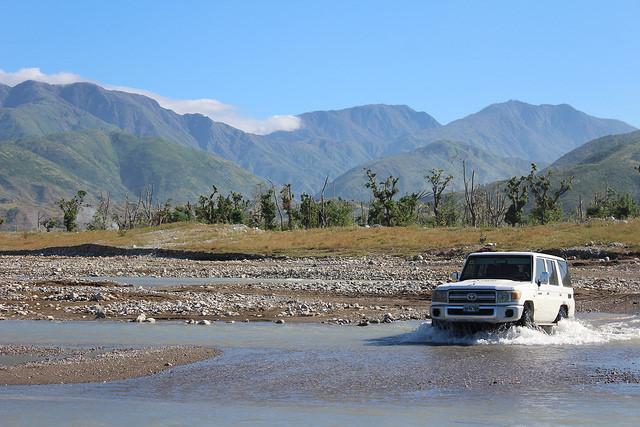
Our mobile clinic team traverses rivers, jagged mountain roads, and other rough terrain to reach communities in need.
In the spring our partners at Build Health International broke ground on a new 7,500 square foot Center for Infectious Disease and Emergency Care, funded in large part by the generosity of the American people through USAID’s American Schools and Hospitals Abroad program. The CIDEC building will provide spaces for our staff to triage critical patients, and to safely and effectively treat those suffering from tuberculosis, diphtheria, and other highly-contagious diseases. We look forward to the new building’s opening in late fall 2017.
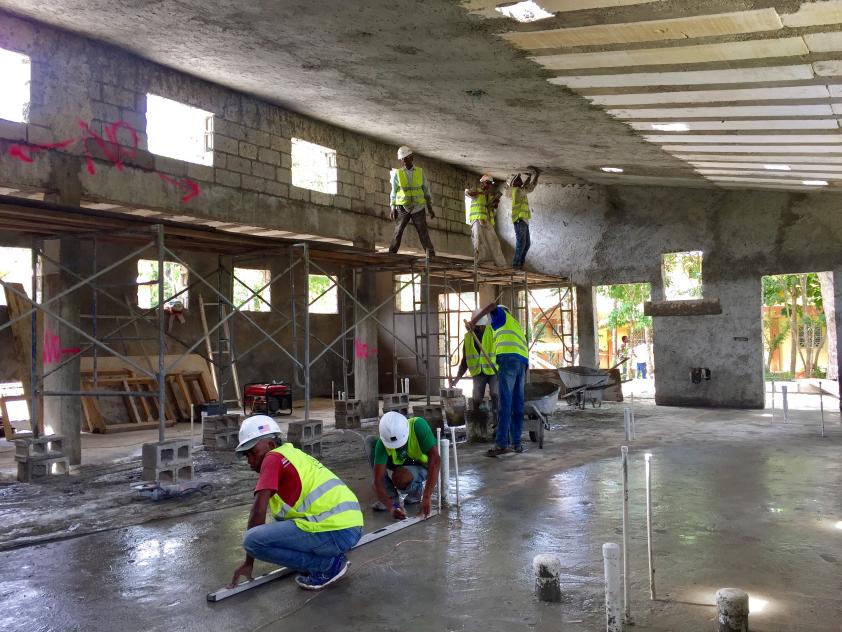
The new Center for Infectious Disease and Emergency Care is nearing completion, thanks to the hard work from our partners at Build Health International and support from USAID’s ASHA program.
Though it has been open and operating since Thanksgiving Day 2016 (less than two months after Hurricane Matthew), this past July we celebrated the official inauguration of our beautiful new surgical center. Guests from the Haitian government, US Embassy in Port au Prince, USAID in Washington, D.C., the Kellogg Foundation, and nearly 200 other partners, local dignitaries, and community members joined our staff and friends in a celebration of the new center and the surgical team’s huge impact on the lives of thousands of people. “St. Boniface Hospital and this surgical center serve as a model in Haiti for the advancement of best practices in building medical facilities and performing surgeries,” said Charge d’Affaires of the U.S. Embassy in Haiti, Brian Shukan.
The center is now treating nearly 250 people each month, most of whom would have no other access to the surgical care they need. With your support, our team will continue to provide excellent care to all who need it for many years to come.
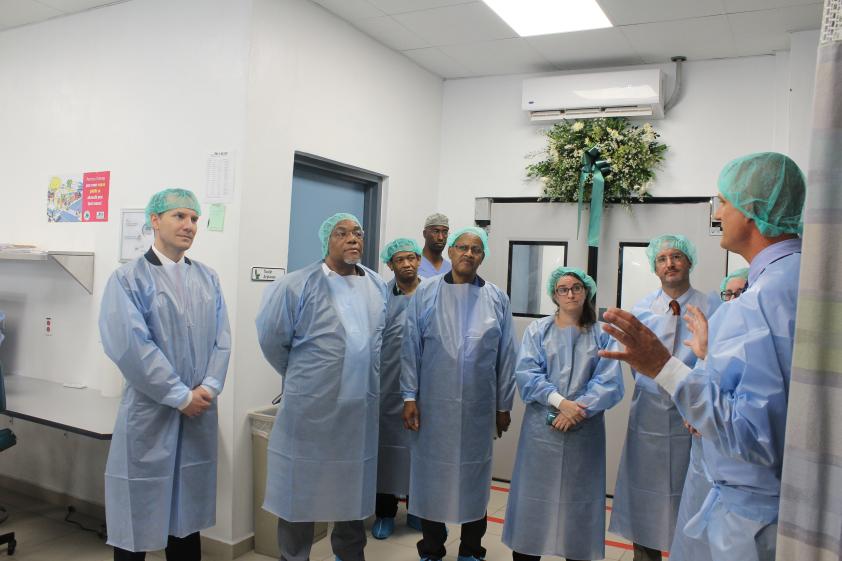
Representatives from USAID, the US Embassy, and the Haitian Ministry of Health getting a tour of our new Surgical Center from Drs. Luther Ward and Michelson Padovany.
When Hurricane Matthew washed out the only road connecting Fond des Blancs with the rest of the Southern Peninsula, it reinforced the precariousness of our hospital’s remote, off-the-grid location and its inability to function without regular deliveries of diesel fuel for our two electrical generators. So, we were thrilled when, this July, we flipped the switch to turn on SBH’s brand new solar power system. The 600 panels and 130 batteries will provide approximately 60% of the energy needed to operate the hospital every day, with the generators filling the gap. We are hoping to expand the system in the future to fill even more of the hospital’s energy needs with clean, safe, self-generating solar power.
Solar panels are filling 60% of SBH’s electrical needs, providing safe, clean, reliable and sustainable power for better patient care.
With support from the W.K. Kellogg Foundation, Build Health International completed a new 10,000 square foot warehouse and distribution center in Fond des Blancs this summer. This massive new warehouse will allow our supply chain team to centralize the storage and distribution of medications and supplies. Moving from 11 small depots and storage areas to one main facility has made it easier to track inventory, fill requests, and ensure that medications and supplies are available when and where our staff and patients need them. The warehouse can also serve as a regional distribution center in future emergencies, thus increasing resilience and security for the entire peninsula.
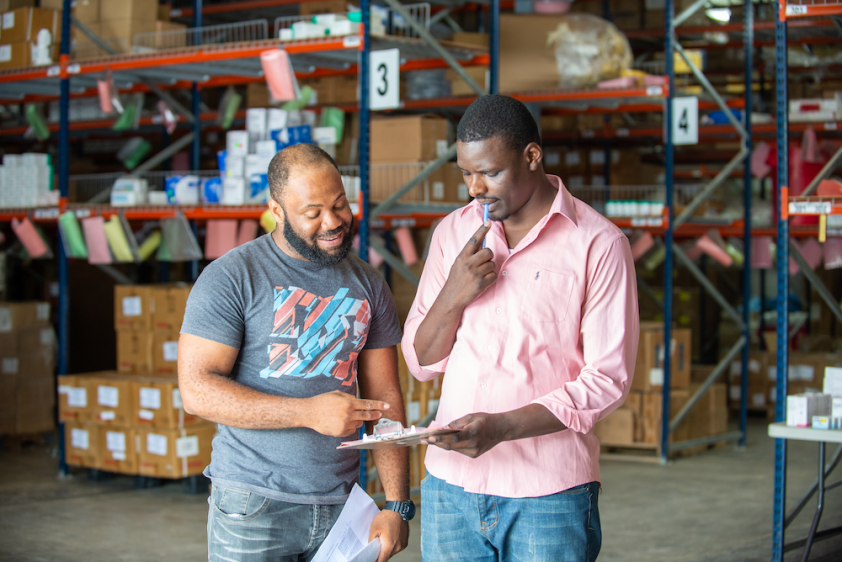
Our new warehouse is centralizing and streamlining our supply chain, so we can be sure that patients and staff have consistent access to the medicines and supplies they need, when and where they need them.
Your donation will help Nurse Laguerre provide the highest-quality care to every patient in need.
